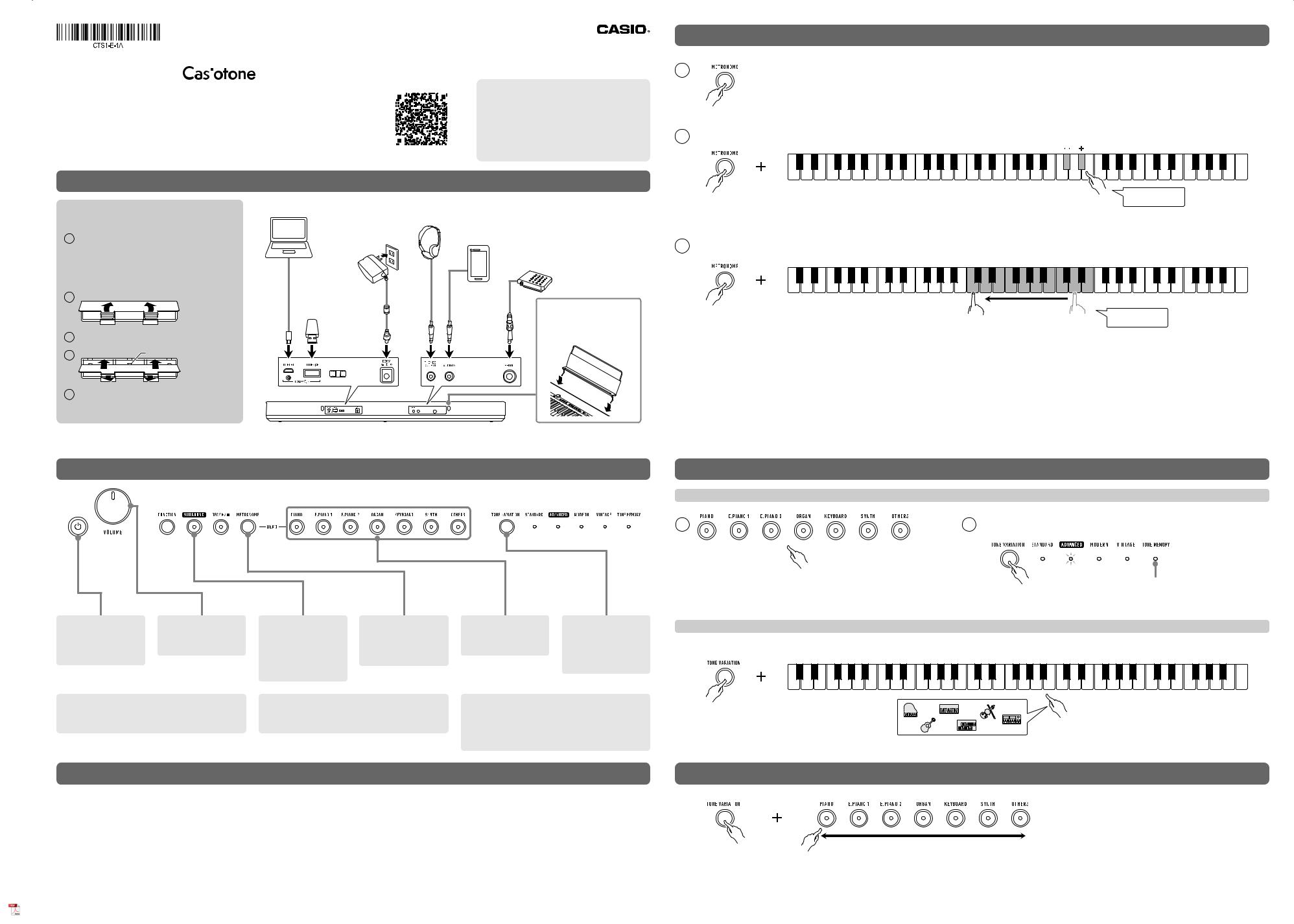Casio CT-S1BK, CT-S1WE, CT-S1RD User manual

EN
CT-S1 |
After reading this document, keep it in a safe place along with the warranty certificate. Be sure to read the |
|||||||||||||||||||||
“Safety Precautions” in the separate “READ THIS!” sheet, and use the product correctly. |
||||||||||||||||||||||
|
|
|
|
|
|
|
|
|
|
|
|
|
|
|
|
|
|
|
|
|
|
Included Accessories |
|
|
|
|
|
|
|
|
|
|
|
|
|
|
|
|
|
|
|
|
|
|
|
Quick Start Guide |
|
|
|
|
|
|
|
|
|
|
|
|
|
|
|
|
|
|
|
|
● Music Stand |
|
For more detailed information about the product and its operation, visit the CASIO website. |
|
|
|
|
|
|
|
|
|
|
|
|
|
|
|
|
|
|
|
● Strap Lock (enclosed with music stand) |
||
Available Information: User’s Guide, etc. |
|
|
|
|
|
|
|
|
|
|
|
|
|
|
|
|
|
|
|
|
● Leaflets |
|
https://support.casio.com/global/en/emi/manual/CT-S1/ |
|
|
|
|
|
|
|
|
|
|
|
|
|
|
|
|
|
|
|
|
● READ THIS! Sheet |
|
|
|
|
|
|
|
|
|
|
|
|
|
|
|
|
|
|
|
|
|
|||
|
|
|
|
|
|
|
|
|
|
|
|
|
|
|
|
|
|
|
|
|
|
● Other (Warranty, etc.) |
|
|
|
|
|
|
|
|
|
|
|
|
|
|
|
|
|
|
|
|
|
|
Items included as accessories are subject to change |
|
|
|
|
|
|
|
|
|
|
|
|
|
|
|
|
|
|
|
|
|
|
without notice. |
Preparation
|
Computer, smartphone, etc. (commercially available) |
|
Preparing a Power Supply |
• Connect using a USB cable that is no more than two meters long. |
|
■ Using the AC Adaptor |
Headphones (sold separately) |
|
|
|
|
1 Connect the AC adaptor as shown in the right |
AC adaptor |
Portable audio player, etc. (commercially available) |
illustration. |
|
|
● Make sure that you use only the AC adaptor specified |
|
|
for this Digital Keyboard. |
|
Pedal (sold separately) |
■ Using Batteries
1Bottom of console
|
Open |
CASIO-specified device |
To install the music stand |
|
(sold separately) |
||
|
|
|
|
|
|
|
Insert the stand into the holes |
|
|
|
on the back of the console. |
2 |
Load six AA-size batteries. |
|
|
3 |
Tabs |
|
|
|
|
|
|
|
Close |
|
|
4 Specify the battery type. Back See “Specifying the Battery Type” on the reverse
side of this sheet.
Practicing with the Metronome
1
2Specify a beat value.
− +
(C2) |
(C3) |
(C4) |
(C5) |
(C6) |
(C7) |
While holding down... |
off, 1 - 16 |
3Specify the tempo.
|
0 |
1 |
2 |
3 |
4 |
5 |
6 |
7 |
8 |
9 |
|
|
(C2) |
(C3) |
(D4) |
(E4) |
(F4) |
(G4) |
(A4) |
(B4) |
(C5) |
|
(E5) |
(C6) |
(C7) |
While holding down...
20 - 255
Example: To set a tempo of 80, press 8 (D5) and then 0 (C4), and then release METRONOME.
Basic Operation
P(Power) button |
VOLUME knob |
Press to turn on power. |
Rotate to adjust overall |
Long-press to turn off |
volume. |
power. |
|
Touch Response
Pressing a key harder produces louder sound, while a softer key press produces softer sound.
SURROUND button |
METRONOME |
Press for a more |
button |
expanded sound. |
Press to sound the |
(Disabled while |
metronome. |
headphones are |
|
connected.) |
|
Auto Power Off
Automatically turns off power after 30 minutes of nonuse. (On, Off switchable)
Main tone buttons |
TONE VARIATION |
Press a button to select |
button |
its tone. |
Press to change to a |
|
different variation of the |
|
currently selected tone. |
Pedal
Sustains notes played while the pedal is depressed. Even if the keys played are released, notes are sustained as if the keys remain pressed, until the pedal is released.
Selecting a Tone
To use the main tones to select an instrument
1 |
2 Select a variation. |
Press to cycle through available variations.
See the procedure below for information about using Tone Memory.
To select a tone using the keyboard keys
PIANO |
E.PIANO |
ORGAN |
KEYBOARD |
SYNTH/OTHERS |
CASIO CLASSIC TONES |
||||||
|
|
|
|
|
|
|
|
|
|
|
|
|
|
|
|
|
|
|
|
|
|
|
|
|
|
|
|
|
|
|
|
|
|
|
|
(C2) |
(C3) |
(C4) |
(C5) |
(C6) |
(C7) |
While holding down...
Useful Functions
For details about operations, refer to the User’s Guide on the CASIO Website. |
|
■ My Setup |
■ Octave Shift |
Save the current setup (tone, etc.) for later recall. |
Raise or lower the pitch of the keyboard in octave units. |
■ Reverb |
■ Transpose |
Output sounds using room, hall, and other acoustic effects. |
Raise or lower the overall pitch in semitone steps. |
Registering the Current Main Tone Setup to a Button (Tone Memory)
Press the button of the tone you want to register.
While holding down...
